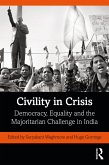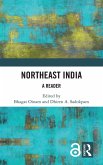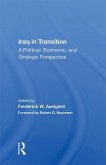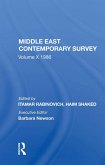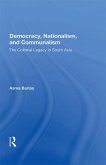Beyond Crisis (eBook, PDF)
Re-evaluating Pakistan
Redaktion: Khan, Naveeda
48,95 €
48,95 €
inkl. MwSt.
Sofort per Download lieferbar

24 °P sammeln
48,95 €
Als Download kaufen

48,95 €
inkl. MwSt.
Sofort per Download lieferbar

24 °P sammeln
Jetzt verschenken
Alle Infos zum eBook verschenken
48,95 €
inkl. MwSt.
Sofort per Download lieferbar
Alle Infos zum eBook verschenken

24 °P sammeln
Beyond Crisis (eBook, PDF)
Re-evaluating Pakistan
Redaktion: Khan, Naveeda
- Format: PDF
- Merkliste
- Auf die Merkliste
- Bewerten Bewerten
- Teilen
- Produkt teilen
- Produkterinnerung
- Produkterinnerung

Bitte loggen Sie sich zunächst in Ihr Kundenkonto ein oder registrieren Sie sich bei
bücher.de, um das eBook-Abo tolino select nutzen zu können.
Hier können Sie sich einloggen
Hier können Sie sich einloggen
Sie sind bereits eingeloggt. Klicken Sie auf 2. tolino select Abo, um fortzufahren.

Bitte loggen Sie sich zunächst in Ihr Kundenkonto ein oder registrieren Sie sich bei bücher.de, um das eBook-Abo tolino select nutzen zu können.
The essays in this volume complicate the sense of Pakistan as prone to failure. It is recast as a prolonged meditation on the artificiality of the state form, the difficulty of committing to a single nationalist vision, the foreignness that resides within, etc.
- Geräte: PC
- mit Kopierschutz
- eBook Hilfe
- Größe: 5.86MB
Andere Kunden interessierten sich auch für
![Crisis in the Caribbean (eBook, PDF) Crisis in the Caribbean (eBook, PDF)]() Crisis in the Caribbean (eBook, PDF)51,95 €
Crisis in the Caribbean (eBook, PDF)51,95 €![Civility in Crisis (eBook, PDF) Civility in Crisis (eBook, PDF)]() Civility in Crisis (eBook, PDF)36,95 €
Civility in Crisis (eBook, PDF)36,95 €![Northeast India (eBook, PDF) Northeast India (eBook, PDF)]() Northeast India (eBook, PDF)42,95 €
Northeast India (eBook, PDF)42,95 €![Iraq In Transition (eBook, PDF) Iraq In Transition (eBook, PDF)]() Frederick W AxelgardIraq In Transition (eBook, PDF)30,95 €
Frederick W AxelgardIraq In Transition (eBook, PDF)30,95 €![Classical Marxism in an Age of Capitalist Crisis (eBook, PDF) Classical Marxism in an Age of Capitalist Crisis (eBook, PDF)]() William BriggsClassical Marxism in an Age of Capitalist Crisis (eBook, PDF)43,95 €
William BriggsClassical Marxism in an Age of Capitalist Crisis (eBook, PDF)43,95 €![Middle East Contemporary Survey, Volume X, 1986 (eBook, PDF) Middle East Contemporary Survey, Volume X, 1986 (eBook, PDF)]() Itamar RabinovichMiddle East Contemporary Survey, Volume X, 1986 (eBook, PDF)30,95 €
Itamar RabinovichMiddle East Contemporary Survey, Volume X, 1986 (eBook, PDF)30,95 €![Democracy, Nationalism, And Communalism (eBook, PDF) Democracy, Nationalism, And Communalism (eBook, PDF)]() Asma BarlasDemocracy, Nationalism, And Communalism (eBook, PDF)30,95 €
Asma BarlasDemocracy, Nationalism, And Communalism (eBook, PDF)30,95 €-
-
-
The essays in this volume complicate the sense of Pakistan as prone to failure. It is recast as a prolonged meditation on the artificiality of the state form, the difficulty of committing to a single nationalist vision, the foreignness that resides within, etc.
Dieser Download kann aus rechtlichen Gründen nur mit Rechnungsadresse in A, B, BG, CY, CZ, D, DK, EW, E, FIN, F, GR, HR, H, IRL, I, LT, L, LR, M, NL, PL, P, R, S, SLO, SK ausgeliefert werden.
Produktdetails
- Produktdetails
- Verlag: Taylor & Francis eBooks
- Seitenzahl: 544
- Erscheinungstermin: 27. April 2012
- Englisch
- ISBN-13: 9781136517594
- Artikelnr.: 38269264
- Verlag: Taylor & Francis eBooks
- Seitenzahl: 544
- Erscheinungstermin: 27. April 2012
- Englisch
- ISBN-13: 9781136517594
- Artikelnr.: 38269264
- Herstellerkennzeichnung Die Herstellerinformationen sind derzeit nicht verfügbar.
Naveeda Khan is assistant professor in the Department of Anthropology at Johns Hopkins University. She received her masters in anthropology from the New School for Social Research in 1995. She completed her Ph.D. in anthropology from Columbia University in 2003, writing her doctoral dissertation on how sectarian violence is folded into everyday life through processes of mosque construction and violent seizures in Lahore, Pakistan. She is currently completing a book manuscript titled 'Muslim Perfectionism: Sectarianism and The Passage of a Promise in Pakistan'.
Acknowledgements 1. Foreword by Veena Das 2. Introduction by Naveeda Khan
Part I: Artificiality of the State 3. Towards a Lyric History of India by
Aamir Mufti 4.The Politics of Commensuration: The Violence of Partition and
the Making of the Pakistani State by Tahir Hasnain Naqvi 5. A Real
Terrorist, An Excerpt from Sayyid Pakistani and the Wedding of the Dead by
Oskar Verkaaik 6. Re-imagining the `Land of the Pure': A Sufi Master
Reclaims Islamic Orthodoxy and Pakistani Identity by Robert Rozehnal Part
II: Nationalist Visions 7. Registering Crisis: Ethnicity in Pakistani
Cinema of the 1960s and 1970s by Iftikar Dadi 8. Listening to the Enemy:
The Pakistani Army, Violence and Memories of 1971 by Yasmin Saikia 9.
Strength of the State Meets Strength of the Street: The 1972 Labour
Struggle in Karachi by Kamran Asdar Ali 10. Learning to be Left: Jama'at-I
Islami in Pakistan by Humeira Iqtidar Part III: Foreignness Within 11. From
Muslims to Apostates: The Legal Construction of Muslim Identity and Ahmadi
Difference by Asad A. Ahmed 12. Words that Wound: Archiving Hate in the
Making of Hindu and Muslim Publics in Bombay by Deepak Mehta 13.
Itineraries of Conversion: Judaic Paths to a Muslim Pakistan by Sadia Abbas
14. Iqbal and Karbala: Re-Reading the Episteme of Martyrdom for a Poetics
of Appropriation by Syed Akbar Hyder Part IV: The Everyday 15. Look Who's
Talking Now: Voice and Authority in Pakistani Shi'i Women's Gatherings by
Amy Bard 16. Madrassa Metrics: The Statistics and Rhetoric of Religious
Enrollment in Pakistan by Tahir Andrabi, Jishnu Das, Asim Ijaz Khwaja, and
Tristan Zajonc 17. Uncivil Politics and the Appropriation of Planning in
Islamabad by Matthew Hull 18. What is it to build a Mosque? Or, the
Violence of the Ordinary by Naveeda Khan 19. Afterword 20. Living the
Tensions of the State, the Nation, and the Everyday by David Gilmartin 21.
Anthropology and the Pakistani National Imaginary by Katherine Pratt Ewing
Notes on Contributors Glossary Bibliograp
Part I: Artificiality of the State 3. Towards a Lyric History of India by
Aamir Mufti 4.The Politics of Commensuration: The Violence of Partition and
the Making of the Pakistani State by Tahir Hasnain Naqvi 5. A Real
Terrorist, An Excerpt from Sayyid Pakistani and the Wedding of the Dead by
Oskar Verkaaik 6. Re-imagining the `Land of the Pure': A Sufi Master
Reclaims Islamic Orthodoxy and Pakistani Identity by Robert Rozehnal Part
II: Nationalist Visions 7. Registering Crisis: Ethnicity in Pakistani
Cinema of the 1960s and 1970s by Iftikar Dadi 8. Listening to the Enemy:
The Pakistani Army, Violence and Memories of 1971 by Yasmin Saikia 9.
Strength of the State Meets Strength of the Street: The 1972 Labour
Struggle in Karachi by Kamran Asdar Ali 10. Learning to be Left: Jama'at-I
Islami in Pakistan by Humeira Iqtidar Part III: Foreignness Within 11. From
Muslims to Apostates: The Legal Construction of Muslim Identity and Ahmadi
Difference by Asad A. Ahmed 12. Words that Wound: Archiving Hate in the
Making of Hindu and Muslim Publics in Bombay by Deepak Mehta 13.
Itineraries of Conversion: Judaic Paths to a Muslim Pakistan by Sadia Abbas
14. Iqbal and Karbala: Re-Reading the Episteme of Martyrdom for a Poetics
of Appropriation by Syed Akbar Hyder Part IV: The Everyday 15. Look Who's
Talking Now: Voice and Authority in Pakistani Shi'i Women's Gatherings by
Amy Bard 16. Madrassa Metrics: The Statistics and Rhetoric of Religious
Enrollment in Pakistan by Tahir Andrabi, Jishnu Das, Asim Ijaz Khwaja, and
Tristan Zajonc 17. Uncivil Politics and the Appropriation of Planning in
Islamabad by Matthew Hull 18. What is it to build a Mosque? Or, the
Violence of the Ordinary by Naveeda Khan 19. Afterword 20. Living the
Tensions of the State, the Nation, and the Everyday by David Gilmartin 21.
Anthropology and the Pakistani National Imaginary by Katherine Pratt Ewing
Notes on Contributors Glossary Bibliograp
Acknowledgements 1. Foreword by Veena Das 2. Introduction by Naveeda Khan
Part I: Artificiality of the State 3. Towards a Lyric History of India by
Aamir Mufti 4.The Politics of Commensuration: The Violence of Partition and
the Making of the Pakistani State by Tahir Hasnain Naqvi 5. A Real
Terrorist, An Excerpt from Sayyid Pakistani and the Wedding of the Dead by
Oskar Verkaaik 6. Re-imagining the `Land of the Pure': A Sufi Master
Reclaims Islamic Orthodoxy and Pakistani Identity by Robert Rozehnal Part
II: Nationalist Visions 7. Registering Crisis: Ethnicity in Pakistani
Cinema of the 1960s and 1970s by Iftikar Dadi 8. Listening to the Enemy:
The Pakistani Army, Violence and Memories of 1971 by Yasmin Saikia 9.
Strength of the State Meets Strength of the Street: The 1972 Labour
Struggle in Karachi by Kamran Asdar Ali 10. Learning to be Left: Jama'at-I
Islami in Pakistan by Humeira Iqtidar Part III: Foreignness Within 11. From
Muslims to Apostates: The Legal Construction of Muslim Identity and Ahmadi
Difference by Asad A. Ahmed 12. Words that Wound: Archiving Hate in the
Making of Hindu and Muslim Publics in Bombay by Deepak Mehta 13.
Itineraries of Conversion: Judaic Paths to a Muslim Pakistan by Sadia Abbas
14. Iqbal and Karbala: Re-Reading the Episteme of Martyrdom for a Poetics
of Appropriation by Syed Akbar Hyder Part IV: The Everyday 15. Look Who's
Talking Now: Voice and Authority in Pakistani Shi'i Women's Gatherings by
Amy Bard 16. Madrassa Metrics: The Statistics and Rhetoric of Religious
Enrollment in Pakistan by Tahir Andrabi, Jishnu Das, Asim Ijaz Khwaja, and
Tristan Zajonc 17. Uncivil Politics and the Appropriation of Planning in
Islamabad by Matthew Hull 18. What is it to build a Mosque? Or, the
Violence of the Ordinary by Naveeda Khan 19. Afterword 20. Living the
Tensions of the State, the Nation, and the Everyday by David Gilmartin 21.
Anthropology and the Pakistani National Imaginary by Katherine Pratt Ewing
Notes on Contributors Glossary Bibliograp
Part I: Artificiality of the State 3. Towards a Lyric History of India by
Aamir Mufti 4.The Politics of Commensuration: The Violence of Partition and
the Making of the Pakistani State by Tahir Hasnain Naqvi 5. A Real
Terrorist, An Excerpt from Sayyid Pakistani and the Wedding of the Dead by
Oskar Verkaaik 6. Re-imagining the `Land of the Pure': A Sufi Master
Reclaims Islamic Orthodoxy and Pakistani Identity by Robert Rozehnal Part
II: Nationalist Visions 7. Registering Crisis: Ethnicity in Pakistani
Cinema of the 1960s and 1970s by Iftikar Dadi 8. Listening to the Enemy:
The Pakistani Army, Violence and Memories of 1971 by Yasmin Saikia 9.
Strength of the State Meets Strength of the Street: The 1972 Labour
Struggle in Karachi by Kamran Asdar Ali 10. Learning to be Left: Jama'at-I
Islami in Pakistan by Humeira Iqtidar Part III: Foreignness Within 11. From
Muslims to Apostates: The Legal Construction of Muslim Identity and Ahmadi
Difference by Asad A. Ahmed 12. Words that Wound: Archiving Hate in the
Making of Hindu and Muslim Publics in Bombay by Deepak Mehta 13.
Itineraries of Conversion: Judaic Paths to a Muslim Pakistan by Sadia Abbas
14. Iqbal and Karbala: Re-Reading the Episteme of Martyrdom for a Poetics
of Appropriation by Syed Akbar Hyder Part IV: The Everyday 15. Look Who's
Talking Now: Voice and Authority in Pakistani Shi'i Women's Gatherings by
Amy Bard 16. Madrassa Metrics: The Statistics and Rhetoric of Religious
Enrollment in Pakistan by Tahir Andrabi, Jishnu Das, Asim Ijaz Khwaja, and
Tristan Zajonc 17. Uncivil Politics and the Appropriation of Planning in
Islamabad by Matthew Hull 18. What is it to build a Mosque? Or, the
Violence of the Ordinary by Naveeda Khan 19. Afterword 20. Living the
Tensions of the State, the Nation, and the Everyday by David Gilmartin 21.
Anthropology and the Pakistani National Imaginary by Katherine Pratt Ewing
Notes on Contributors Glossary Bibliograp


